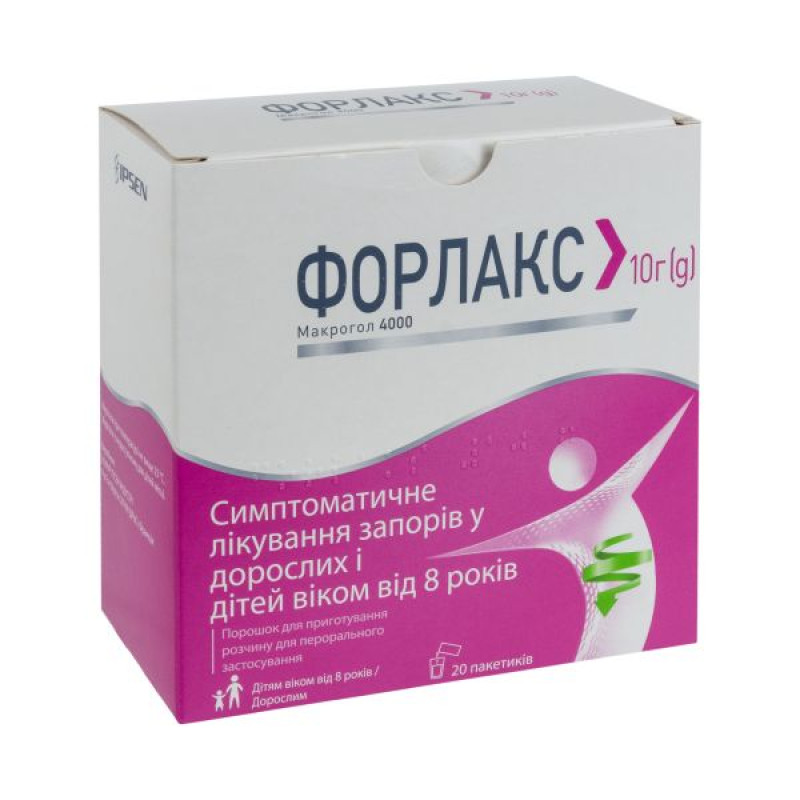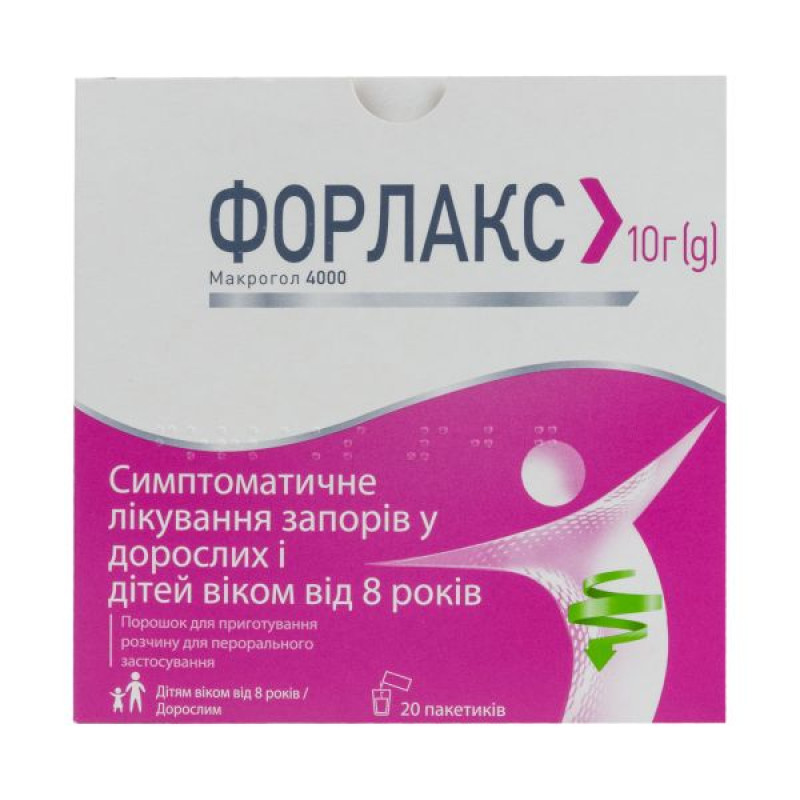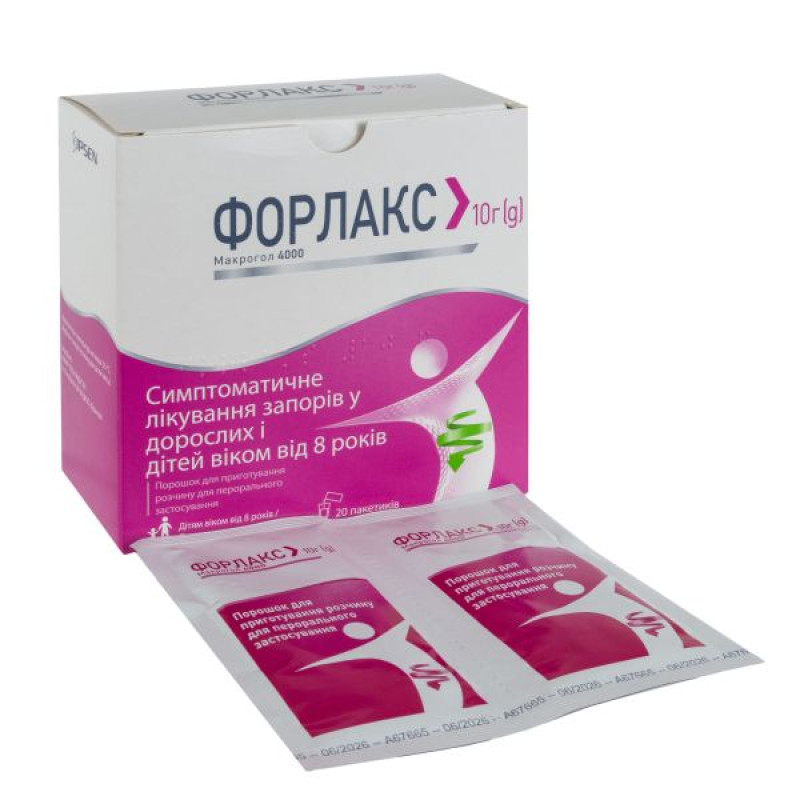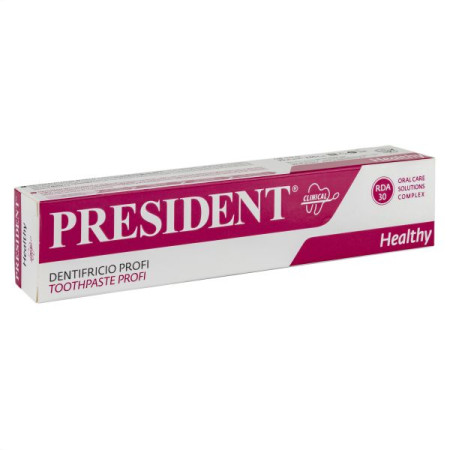Forlax powder for oral solution 10 g sachet No. 20

Instructions Forlax powder for oral solution 10 g sachet No. 20
Composition
active ingredient: macrogol 4000;
1 sachet contains macrogol 4000 10 g;
excipients: sodium saccharin, orange and grapefruit fragrance (orange oil, grapefruit oil, concentrated orange juice, citral, acetaldehyde, linalool, ethyl butyrate, alpha-terpineol, octanal, beta-gamma hexenol, dextrinmaltose, acacia gum, sorbitol (E 420), butylhydroxyanisole (E 320), sulfur dioxide
(E 220)).
Dosage form
Powder for solution for oral administration.
Main physicochemical properties: white or almost white powder, easily soluble in water, with the smell of orange and grapefruit.
Pharmacotherapeutic group
Laxatives. Osmotic laxatives. Macrogol.
ATX code A06A D15.
Pharmacological properties
Pharmacodynamics
Macrogols with high molecular weight (4000) are long linear polymers that retain water molecules through hydrogen bonds. After oral administration, the volume of fluid in the intestine increases. The volume of unabsorbed fluid in the intestine is responsible for the laxative properties of the solution.
Pharmacokinetics
Pharmacokinetic data confirm that macrogol 4000 is not absorbed or metabolized after oral administration.
Indication
Symptomatic treatment of constipation in adults and children aged 8 years and over.
Contraindication
Severe inflammatory bowel disease (e.g. ulcerative colitis, Crohn's disease) or toxic megacolon.
Perforation or risk of perforation of the gastrointestinal tract.
Ileus or suspected intestinal obstruction, symptomatic stenosis.
Abdominal pain syndromes of unknown origin.
Hypersensitivity to the active substance or to any of the excipients of the medicinal product.
Interaction with other medicinal products and other types of interactions
Absorption of drugs taken simultaneously with Forlax may be slowed down. Therefore, it is recommended to take Forlax separately from other drugs, with an interval of at least 2 hours.
Application features
Before starting treatment, it is necessary to make sure that there are no organic intestinal disorders.
Forlax (10 g) is prescribed for the temporary treatment of constipation as an adjunct, provided that appropriate sanitary and hygienic measures and diet are observed, with a maximum duration of treatment for children of 3 months. The fact that the symptoms do not disappear despite compliance with hygienic and dietary recommendations, the root causes should be identified and eliminated.
Treatment of constipation with any medication is only an adjunctive therapy that involves adhering to a healthy lifestyle and eating habits, namely:
consuming more fluids and dietary fiber,
maintaining proper physical activity and restoring bowel function.
The medicinal product contains macrogol (polyethylene glycol). Hypersensitivity (anaphylactic shock, angioedema, urticaria, rash, pruritus, erythema) to medicinal products containing macrogol has been reported, see section "Adverse reactions".
The medicine contains sulfur dioxide, which may occasionally cause serious hypersensitivity reactions and bronchospasm.
This medicine contains sorbitol and is not recommended for patients with fructose intolerance (a rare hereditary condition).
Given the possibility of diarrhea, it should be used with caution in patients prone to fluid and electrolyte imbalance (i.e. elderly patients, patients with impaired liver or kidney function, or patients taking diuretics); monitoring of electrolyte balance is also recommended.
Aspiration has been reported following administration of large volumes of polyethylene glycol and electrolytes via nasogastric tube. Children with neurological speech and motor impairments are at particular risk of aspiration.
Forlax does not contain significant amounts of sugar or polyol and can be used by patients with diabetes or patients following a galactose-free diet.
Use during pregnancy or breastfeeding
Pregnancy
Animal studies do not indicate direct or indirect toxic effects on reproductive function.
Data on the use of Forlax in pregnant women are limited (less than 300 pregnancy outcomes).
No effect during pregnancy is expected, as the systemic exposure of the drug Forlax is insignificant. Forlax can be used during pregnancy.
Breast-feeding
There are no data on the excretion of Forlax into breast milk.
No effects on breastfed newborns/infants are expected, as systemic exposure to Forlax in breast-feeding women is negligible. Forlax can be used during breast-feeding.
No studies on the effect on fertility have been conducted with the drug Forlax, however, since macrogol 4000 is not absorbed to a significant extent, no effect on fertility is expected.
Ability to influence reaction speed when driving vehicles or other mechanisms
Not installed.
Method of administration and doses
For oral use.
Dosage
The dosage is 1–2 sachets (10–20 g) per day, preferably in the morning as a single dose.
The daily dose is determined according to the clinical effect and can range from 1 sachet every other day (especially for children) to 2 sachets per day. The first effect of Forlax occurs within 24–48 hours after administration.
Children
The duration of treatment for children should not exceed 3 months, given the lack of clinical trial data on the use of the drug for a period longer than 3 months.
Restoration of intestinal motility as a result of treatment should be supported by adherence to hygiene and dietary recommendations.
Method of application
The contents of each sachet should be pre-dissolved in a glass of water immediately before use.
Children.
The medicine can be used in children aged 8 years and over. The duration of treatment for children should not exceed 3 months.
Overdose
Diarrhea, abdominal pain and vomiting have been reported. Diarrhea caused by overdose resolves when treatment is temporarily interrupted or the dose is reduced.
Excessive fluid loss due to diarrhea or vomiting may require correction of electrolyte imbalances.
Side effects
Adverse reactions are classified as follows: very common (≥ 1/10); common (≥ 1/100 to < 1/10); uncommon (≥ 1/1000 to < 1/100); rare (≥ 1/10,000 to < 1/1000), rare (< 1/10,000), not known (cannot be estimated from the available data).
Adults
The following adverse reactions have been reported during clinical trials (involving 600 adult patients) and post-marketing use. In general, adverse reactions were minor and transient, and primarily involved the digestive system:
From the digestive system
Common: abdominal pain, bloating, diarrhea, nausea.
Uncommon: vomiting, urgency, involuntary bowel movements.
Metabolism and nutrition
Not known: electrolyte imbalance (hyponatremia, hypokalemia) and/or dehydration, especially in elderly patients.
On the part of the immune system
Not known: hypersensitivity (anaphylactic shock, angioedema, urticaria, rash, itching, erythema).
Children
The following adverse reactions have been reported during clinical trials (including 147 children aged 6 months to 15 years) and post-marketing use. As in the adult population, the adverse reactions were mostly minor and transient, and primarily concerned the digestive system:
From the digestive system
Common: abdominal pain, diarrhea*.
Uncommon: vomiting, abdominal distension, nausea.
On the part of the immune system
Not known: hypersensitivity (anaphylactic shock, angioedema, urticaria, rash, itching).
*Diarrhea can cause pain in the perianal area.
Expiration date
3 years.
Storage conditions
Store at a temperature not exceeding 25 ° C. Keep out of the reach of children.
Packaging
10.167 g of powder per sachet; 10 or 20 sachets per carton.
Vacation category
Without a prescription.
Producer
BEAUFOUR IPSEN INDUSTRIE.
Address
65 Quai Georges Gorse 92100 Boulogne-Billancourt, France / 65 Quai Georges Gorse 92100 Boulogne-Billancourt, France.
Applicant
IPSEN CONSUMER HEALTHCARE Simplified Joint Stock Company.
There are no reviews for this product.
There are no reviews for this product, be the first to leave your review.
No questions about this product, be the first and ask your question.
















